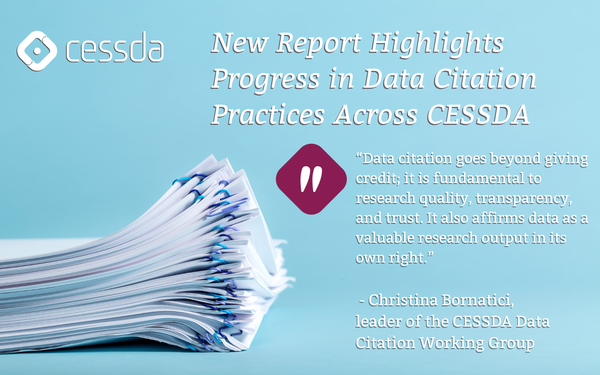
New Report Highlights Progress in Data Citation Practices Across CESSDA
A new report from the CESSDA Data Citation Working Group reveals that CESSDA’s Service Providers (SPs) across Europe are making significant progress in promoting and implementing consistent data citation practices.
The Monitoring Report 2024–2025: Data Citation Practices among CESSDA Service Providers reviews how repositories are putting CESSDA’s Data Citation Recommendations into practice. It finds that data citation is becoming a well-established norm within the CESSDA community, and that Service Providers are taking concrete steps to make citation easier, clearer, and more consistent.
According to the findings, all 19 responding Service Providers now request users to cite the data they access, and most display citation examples directly on dataset landing pages. Many also include reminders at the point of download, reinforcing the importance of proper attribution and good scholarly practice.
The report notes that most repositories already provide the six core components of a complete data citation: author, title, year, version, publisher, and persistent identifier (PID).
However, there is still room for improvement in how dataset versions are documented and how metadata standards are applied. Ensuring that each dataset version can be uniquely cited and accessed is essential for transparency and reproducibility in research.
Technical progress is also evident. Sixteen Service Providers now offer metadata in standardised, machine-readable formats, such as DDI or DataCite schema, making it easier for systems to exchange and harvest information. Still, the report calls for broader use of frameworks like DCAT-AP and Schema.org to enhance interoperability and compliance with FAIR data principles.
Another area of development is the use of persistent identifiers such as ORCID and ROR IDs to connect datasets with their authors and institutions. These connections make it easier to trace data contributions and strengthen the visibility of research outputs.
 “Data citation goes beyond giving credit; it is fundamental to research quality, transparency, and trust. It also affirms data as a valuable research output in its own right. Data repositories play a key role in enabling data citation, ensuring interoperability, and raising awareness across the research ecosystem. I am pleased to see the progress made by SPs, and the Working Group remains committed to supporting further advancement,” said Christina Bornatici, Leader of the CESSDA Data Citation Working Group.
“Data citation goes beyond giving credit; it is fundamental to research quality, transparency, and trust. It also affirms data as a valuable research output in its own right. Data repositories play a key role in enabling data citation, ensuring interoperability, and raising awareness across the research ecosystem. I am pleased to see the progress made by SPs, and the Working Group remains committed to supporting further advancement,” said Christina Bornatici, Leader of the CESSDA Data Citation Working Group.
While progress is clear, the Working Group also highlights the need for greater awareness-raising. Only a few Service Providers currently provide detailed guidance on why data citation matters or collaborate nationally with journals, funders, or research organisations to promote it.
Overall, the report paints an encouraging picture: CESSDA’s Service Providers are taking steady, coordinated steps towards a more transparent and interoperable European research ecosystem, one where data citation is not just recommended, but routine.